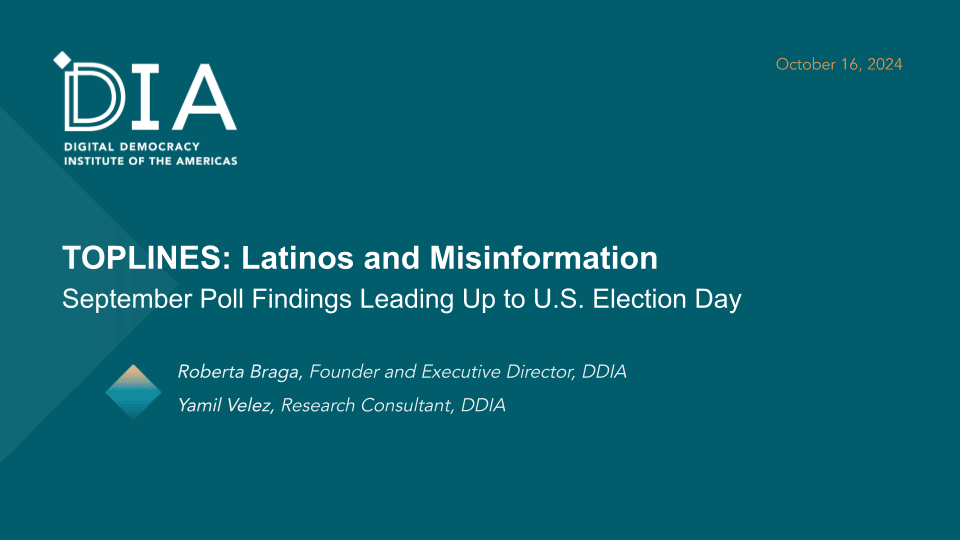Just three weeks out from Election Day, DDIA is shedding light on the conspiratorial narratives and false claims penetrating most among U.S. Latinos through a preview of top lines from a new September poll of 3,000 Latino adults in the United States.
In this survey, we measured the following:
Familiarity and belief in a series of misinformation narratives and claims over time.
Changes in levels of trust in elections, and efficacy and vote intention since the primaries.
Agreement with new election-specific claims about Kamala Harris and Donald Trump.
Sentiments around immigration-related topics.
This poll is a follow-up to one we conducted of 3,015 Latinos in March/April, in the aftermath of Super Tuesday, and included 881 individuals who also completed the initial survey. Note the findings below are the most timely. A full analysis of the entire survey will be available at a later date.
DownloadKey Findings
Exposure to Misinformation Remained Stable (see details in body of document)
Latinos are familiar with misinformation narratives and claims at about the same rate in September as they were in March/April, despite an uptick in the volume of falsehoods leading up to Election Day.
Claims and narratives that had been seen by over 40% of Latinos, such as corporations controlling politics, elites censoring the truth, Democrats failing to secure the border to increase votes, polls being manipulated, a “Deep State” existing, Democrats engaging in election fraud, and Russia controlling the US, were not seen by a larger percentage of participants over time, reflecting an already high saturation level.
Rates of uncertainty also remain very high. As we found in our initial poll, while the majority of Latinos are not subscribing to disinformation and misinformation, a significant number express high levels of uncertainty regarding the veracity of various claims.
Belief in Conspiratorial Narratives Regarding Elites Decreased (see details in body of document)
There was a noticeable decrease from March/April to September in the number of Latinos who believed in the following narratives:
“There is a Deep State composed of shadowy political figures that is working against the public.”
“Traditional values are being eroded by a leftist political agenda that is being implemented in schools.”
“Corporations are all-powerful in American politics, with little room for the public to make a difference.”
Belief in Narratives About Russian Influence Increased (see details in body of document)
Belief in the narrative that “Russia is controlling American politics by undermining our elections and causing rifts between Americans,” increased, possibly due to headlines around Russia’s RT covertly funding U.S. influencers and new U.S. Department of Justice reporting around Russian malign influence operations.
Trust in Some Democratic Institutions and Stakeholders Increased (see details in body of document)
One of the most positive developments observed in this DDIA poll was a broad increase in trust across various election-related actors.
Confidence in secretaries of state and election administrators saw modest improvements (by about 3-4 points), with Latinos in our sample being more likely to believe that these officials will act appropriately on Election Day. We also saw modest gains in trust towards Democrats to “do the right thing” during the election from 41% to 45%, while trust toward Republicans to “do the right thing” stayed at around 31%.
Reception of Political Narratives About Donald Trump and Kamala Harris are as follows (see details in body of document):
On average, Latino voters were more likely to agree with claims that are less favorable to Donald Trump than they were to agree with claims attacking Harris (roughly a majority of Latinos in our sample accepted these claims, whereas the anti-Harris claims were accepted by roughly one-third of Latinos in our sample). These included:
“Donald Trump is too old to be President.” (52% agreeing in our sample)
“Donald Trump is running for President to get richer.” (41% agreeing in our sample)
“Donald Trump is running for President so he won’t go to jail.” (44% agreeing in our sample)
Despite this, certain claims targeting Kamala Harris have also gained traction among Latinos, with roughly one-third agreeing with the following statements regarding her handling of the border and accusations of price fixing:
“Kamala Harris wants to control the price of food.” (37% agreeing in our sample)
“Kamala Harris is a border czar who failed to fix the issue of immigration during her time as Vice President.” (41% agreeing in our sample)
The false narrative that “Latin American countries are sending criminals and mentally ill individuals across the U.S. border,” was accepted by 33% of Latinos in our sample.
More persuadable Latino voters see some truth in claims about Kamala Harris mishandling the U.S.-Mexico border while simultaneously having concerns about Donald Trump’s motivations for running for office.
Latino voters who rate Trump and Harris equally on a 0-100 “Feeling Thermometer” (they feel ambivalent about both), tended to align with Trump supporters on border-related claims about Harris mishandling immigration, but sided with Harris supporters regarding criticisms of Trump’s motivations for running for office, including that he is too old to run, that he is running to stay out of jail, and and that he is running to get richer.
Attitudes Toward Immigration (see details in body of document):
DDIA measured agreement and disagreement with ten immigration-related statements.
Our findings indicate strong positive attitudes among U.S. Latinos toward immigrants in general, with high levels of agreement among Latinos we polled that “immigrants positively contribute to American communities” and that “immigrants improve America by bringing new ideas and cultures.”
This perspective likely aligns with many Latinos’ personal experiences and family histories, reinforcing the value they see in America’s immigrant tradition.
BUT, when it comes to unauthorized immigration, beliefs become more complex. Nearly half of Latino survey respondents agree that “Increased illegal immigration brings increased crime” (47% agree) and that “immigrants can be a drain on local resources” (44% agree). That said, Latinos mostly reject the statement that “immigrants take jobs away from people who were born in the United States” (52% disagree).
Despite increasing misinformation about non-citizen voting as we approach the election, we are not seeing an uptick in beliefs related to the topic. Across the two polls, we find that similar numbers of Latinos accept claims that Democrats are failing to secure the border for electoral gain and narratives that Democrats are engaging in electoral fraud.
Just slightly over 40% of those who had seen “Democrats are failing to secure the U.S. southern border in order to allow undocumented immigrants to vote for them in U.S. elections” accepted the claim in both of our surveys. These estimates stayed pretty similar across waves (41% in our March/April poll; 40% in our September poll).
Roughly 35% exposed to the narrative that “Democrats have won elections by resorting to fraud and electoral manipulation” accepted this narrative in both surveys, with no discernible increase in these beliefs.
This split highlights the nuanced views within the Latino community regarding different aspects of immigration, suggesting that simplistic messaging on this issue may not resonate effectively with many Latino voters.
The Surprising Stability of Misinformation Claims and Narratives
Our follow-up study uncovered a promising trend in Latino voters’ responses to misinformation. As the 2024 election approaches, we are observing a decline in the acceptance of certain conspiracy theories and misleading broader narratives.
Belief in the narrative that “there is a Deep State composed of shadowy political figures that is working against the public” among those who have seen it has decreased from 42% to 36% between our two survey waves. Said another way, the total percentage of Latinos who accept this has dropped from 21% to 17%.
Fewer respondents now accept the narrative that “traditional values are being eroded by a leftist political agenda that is being implemented in schools,” from 42% in March/April to 41% in September. Total percentage of Latinos who accept this dropped from 22% to 20%.
And, there’s a slight reduction in the belief that “corporations are all-powerful in American politics, with little room for the public to make a difference,” from 50% to 47% among those who have seen it. Total percentage of Latinos who accept this dropped from 28% to 25%.
One exception to these trends is belief in the broader narrative that “Russia is controlling American politics by undermining our elections and causing rifts between Americans” which has increased from 31% to 38% among those who have seen this message. This is a shift from 12% to 15% of the total sample accepting this claim.
Other claims like Democrats failing to secure the border to receive votes and engaging in electoral fraud were accepted by similar numbers across the two waves. 40-41% of Latinos in our sample who had seen the border claim accepted it and 35-36% of Latinos in our sample who had seen the fraud claim accepted it. For the border claim, this corresponds to 20% of the total sample, whereas this number is 16% for the fraud claim.
These shifts suggest that efforts to counteract misinformation may be having a positive effect within the Latino community, as beliefs are either stable or improving across a variety of claims and narratives that we measured across waves. Still, it is worth flagging that measurement error could also be responsible for some of the trends we observe over time.
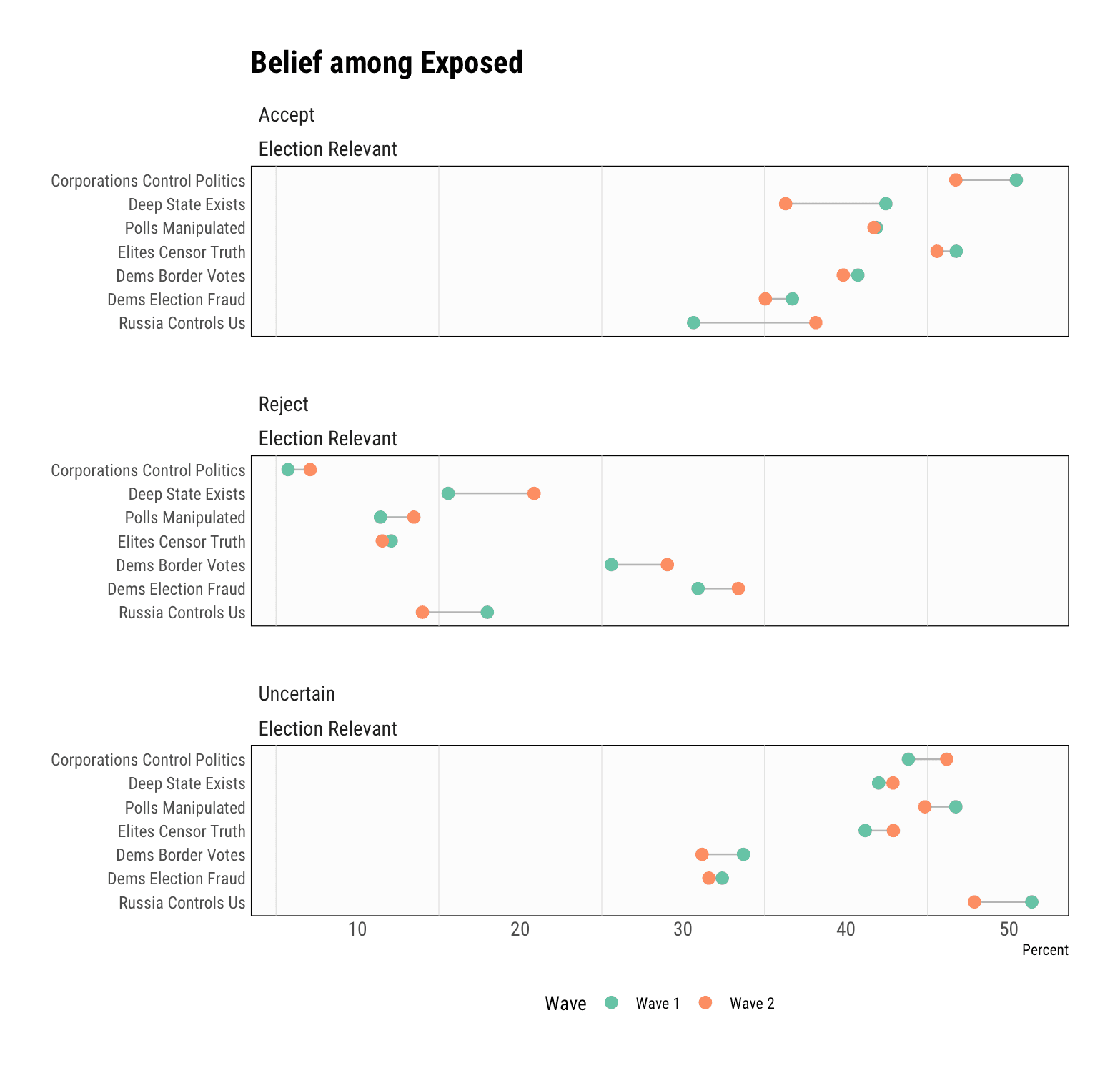
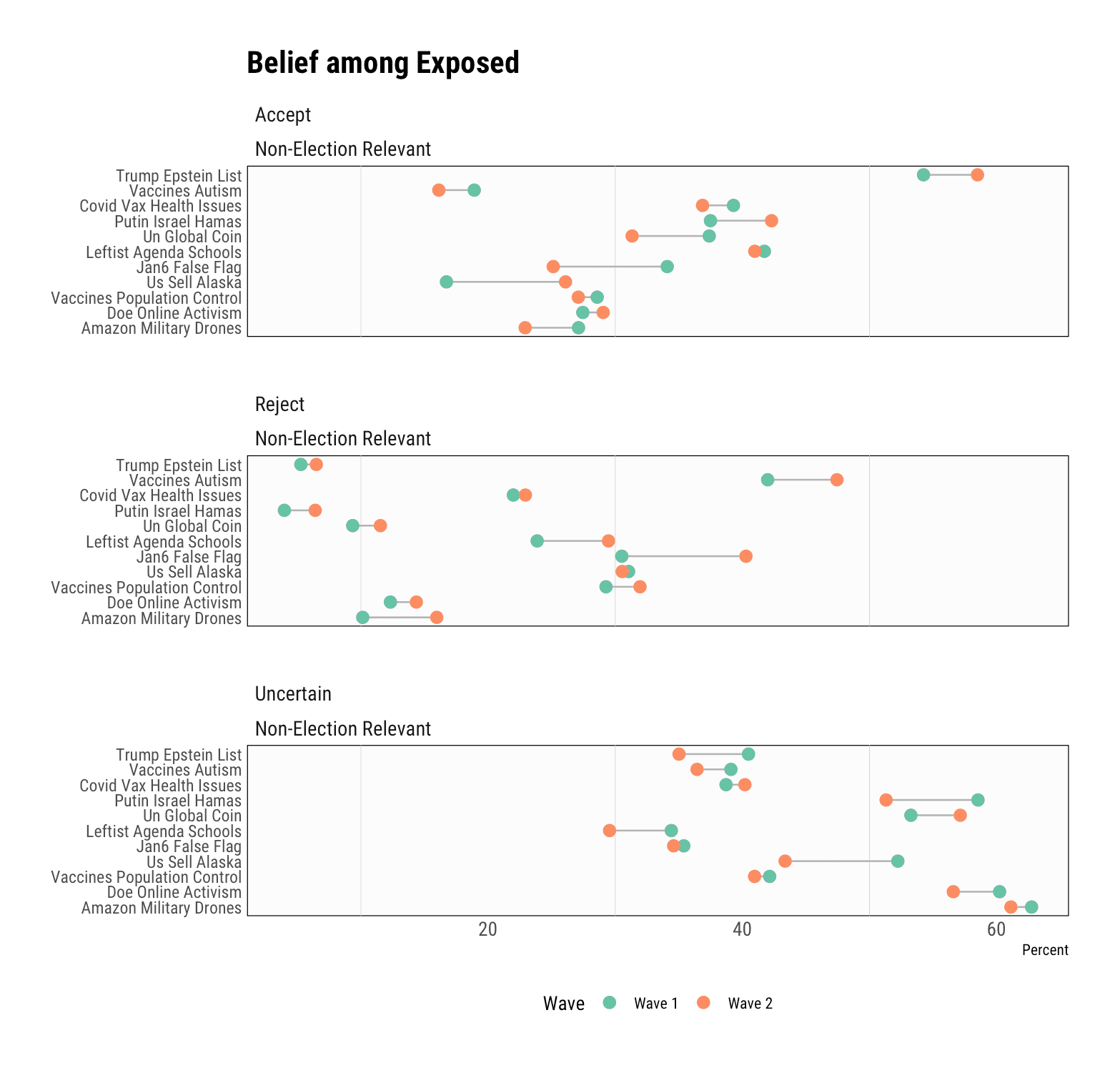
Figures 1 and 2. Belief estimates among those exposed to different claims and narratives. Minimal shifts in acceptance and rejection are observed, with the exception of reductions in beliefs that corporations control politics and a Deep State exists. Beliefs in Russian control over US politics have increased.
Two new salient false claims we tested in this poll included:
“Kamala Harris is a communist.”
37% of the sample have seen this claim
Of those who have seen it, 32% believe this claim
Total of 12% of the sample have both seen and believe this claim
“Kamala Harris misrepresents herself as African American.”
48% of the sample have seen this claim
Of those who have seen it, 32% believe this claim
Total of 15% of the sample have both seen and believe this claim
Rising Trust in Democratic Institutions
The increase in trust across various democratic institutions is one of the most reassuring developments from our study. Confidence in secretaries of state and election administrators has grown, indicating that Latinos are more likely to believe these officials will conduct fair and accurate elections. This trend is particularly important given the context of recent years, where trust in democratic processes has been challenged.
On average, across the full sample, trust in Secretaries of State has increased by 3 points from 41% to 44% across survey waves. Election administrators have also seen gains in trust, with a movement from 43% to 47% across the two waves.
The percentage of Latino voters in the sample who trust Democrats to “do the right thing” during Election Day has jumped from 41% to 45%. Regarding Republicans, roughly 31% of Latinos in our two waves reported trusting that they will do the right thing. Estimates have remained stable at relatively low levels of trust.
The growing trust in the electoral system may serve as a counterbalance to the negative effects of election-specific misinformation. As Latino voters place more faith in the institutions responsible for ensuring fair elections, they may be less influenced by unfounded claims of widespread fraud or manipulation.
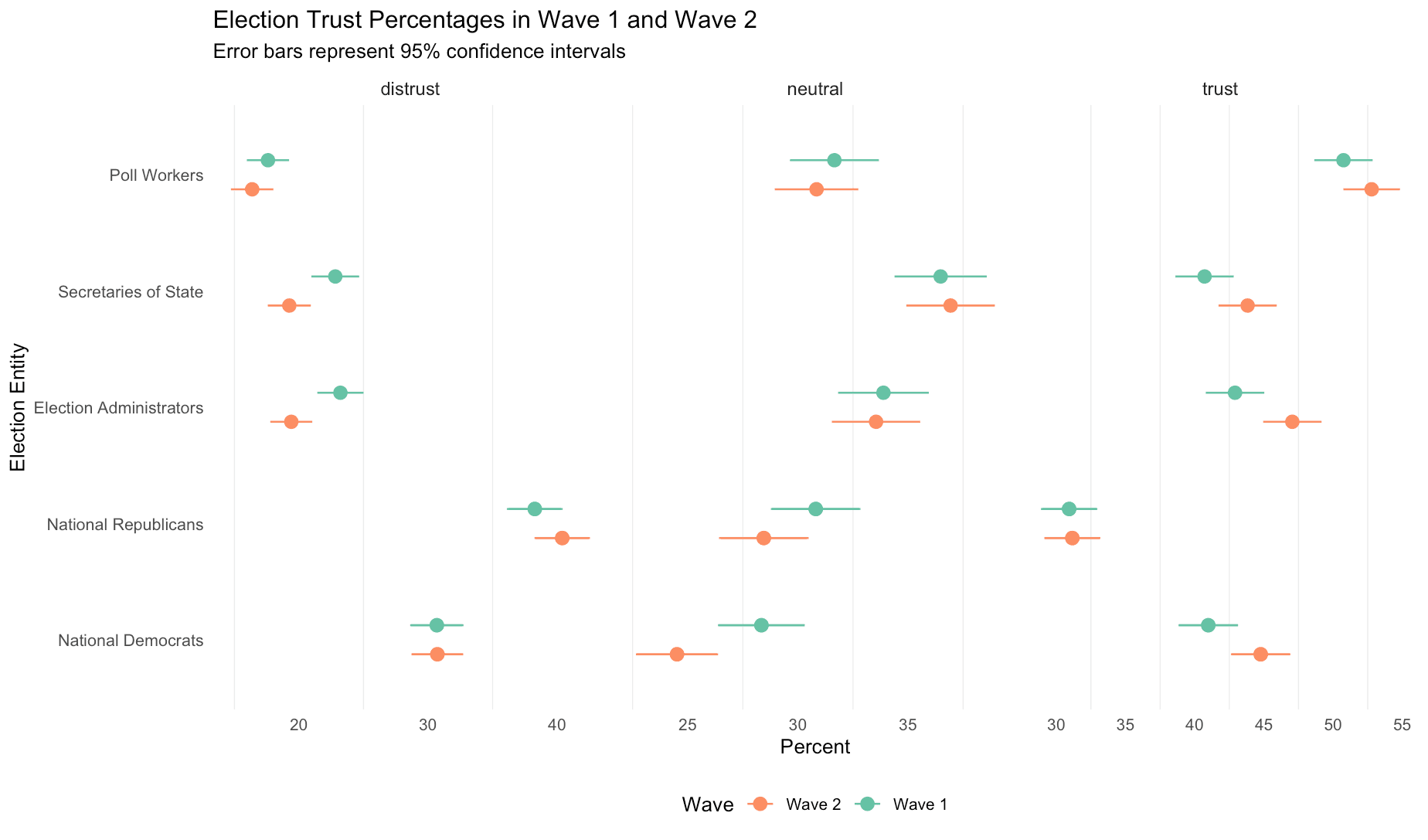
Figure 3. Trust estimates for various election-related groups and parties. Trust has increased slightly for election administrators, secretaries of state, and election administrators.
Views on Harris and Trump Political Narratives
Overall, messages and claims that are less favorable to Donald Trump receive higher levels of agreement among Latino voters than those related to Kamala Harris. Claims expressing concerns about Trump’s age or questioning his motivations for running have gained more traction within this demographic. However, this does not indicate a complete rejection of anti-Harris narratives. Certain criticisms of Kamala Harris, particularly regarding border issues and accusations of price fixing, have also resonated with some voters. This suggests that Latinos are not consuming one-sided narratives, but are engaging with a variety of claims that cross the political aisle.
Donald Trump is too old to be President (52% agree, 30% disagree, 16% are ambivalent (i.e., select neither agree nor disagree), 2% are uncertain (i.e., select Don’t Know as an option))
Kamala Harris is a border czar who failed to fix the immigration issue during her time as Vice President (41% agree, 32% disagree, 22% neither agree nor disagree, 6% are uncertain)
Non-citizens are regularly voting in national U.S. elections (26% agree, 43% disagree, 24% neither agree nor disagree, 6% are uncertain)
Project 2025 is a proposal that will undermine Americans’ rights (45% agree, 14% disagree, 31% neither agree nor disagree, 11% are uncertain)
Trump will implement Project 2025 if elected (46% agree, 20% disagree, 26% neither agree nor disagree, 8% are uncertain)
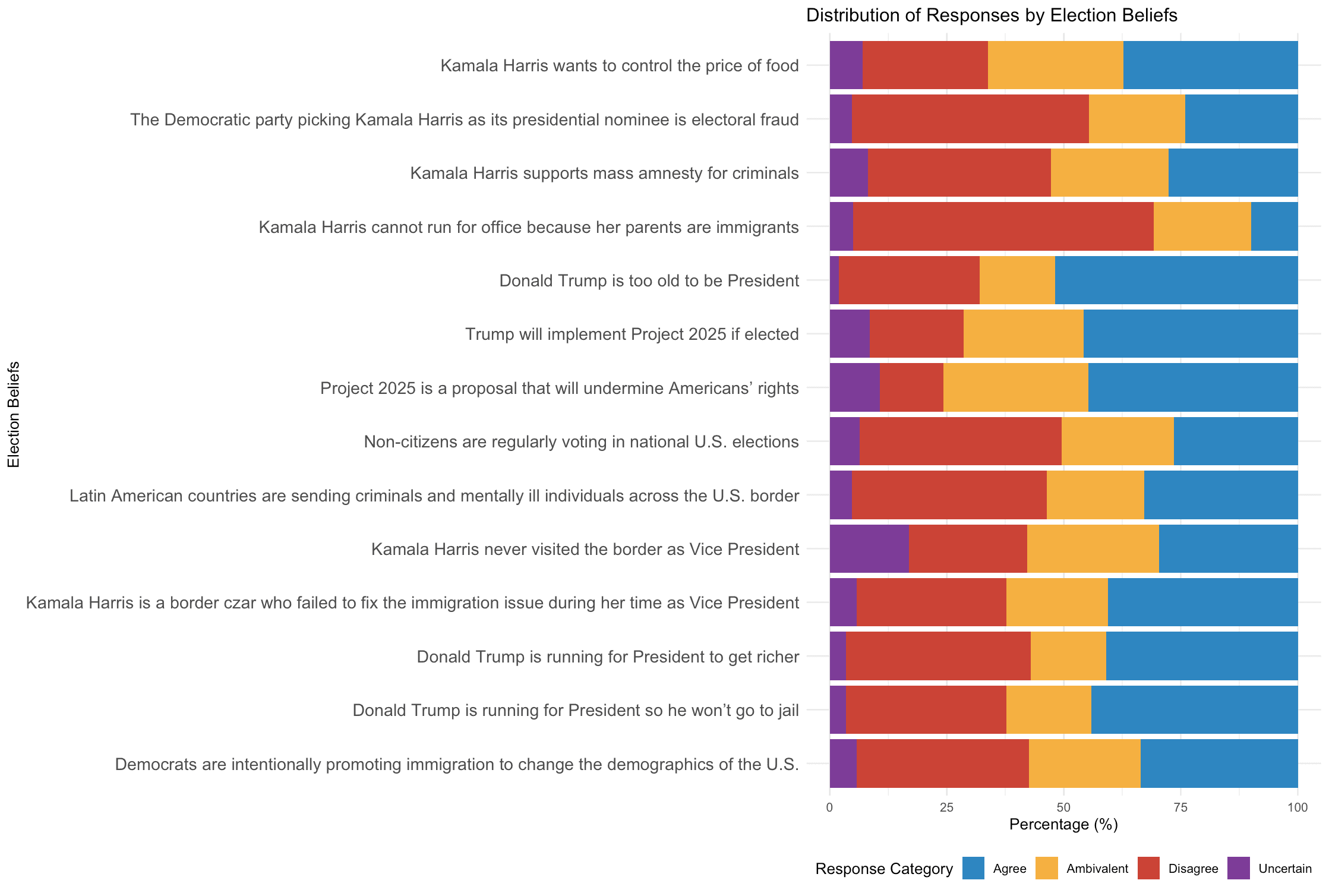
Figure 4. Belief estimates for various messages and salient arguments, some outright false and some misleading, that have emerged during the 2024 election.
Belief Differences Among Harris and Trump Supporters, and Those In Between
When examining different voter subgroups defined by their feelings towards Harris and Trump, we observe interesting patterns. Ambivalent voters, who hold similar feelings toward both candidates on a 0-100 scale that ranges from cold to warm sentiment, align more closely with Trump supporters on border-related claims but side with Harris supporters regarding criticisms of Trump’s motivations and age. This indicates that these persuadable voters are selectively accepting narratives from both sides. Put another way, weaknesses for Trump among these voters in the “persuadable middle” involve his age and motivations, whereas Harris’s handling of the border is perceived more negatively among this group.
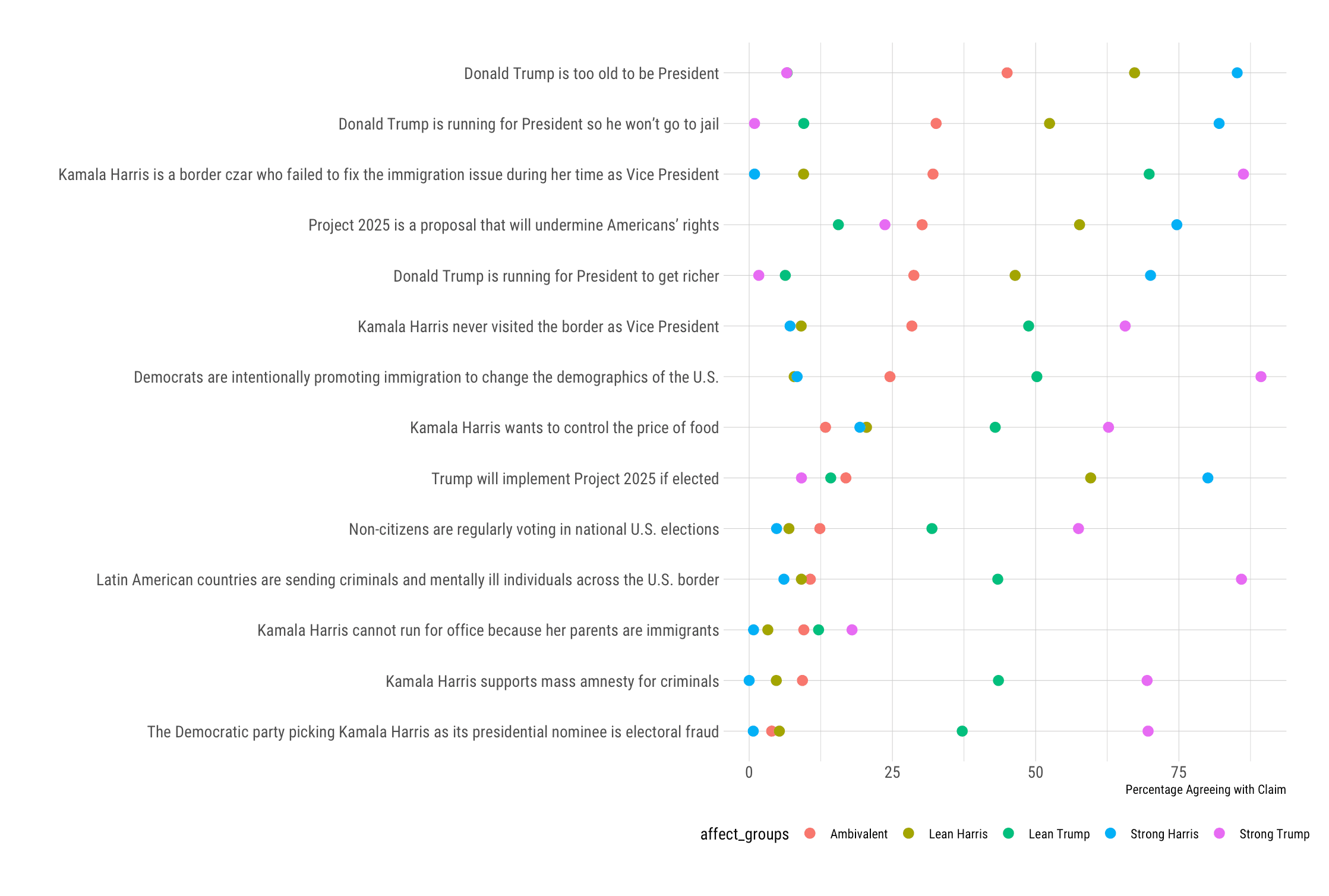
Figure 5. Percent of Latinos in our sample from various subgroups who agree with salient claims emerging during the election season. Ambivalent Latinos are those who rate Trump and Harris equally on a 0-100 feeling thermometer scale, which measures “warmth” toward candidates and parties. Strong supporters are those who rate their preferred candidate 100, and the competitor 0. Leaners generally rate one candidate higher than the other, but still express some warmth toward the other candidate.
Attitudes About Immigration Among Latinos
Our study finds strong positive attitudes toward immigrants in general among Latino voters, with high agreement that immigrants contribute positively to communities and society at large. This widespread support likely reflects personal and immigrant histories within the community. However, attitudes become more complex when discussing unauthorized immigration.
Nearly half of respondents express concerns that increased unauthorized migration can bring increased crime (47%) or strain local resources (44%). Interestingly, the notion that immigrants “take jobs” from native-born workers is not as widely accepted in comparison – 29% agree with this claim.
This suggests that while there are concerns about certain aspects of immigration, Latino voters recognize the overall benefits of immigration and may not respond to simplistic or alarmist messaging on the issue.
The statements break down as follows:
Immigrants take jobs away from people born in the U.S.: 52.1% disagree, 29.1% agree
Immigrants can be a drain on local resources: 35.8% disagree, 43.7% agree
Increased illegal immigration brings increased crime: 34% disagree, 47.1% agree
Immigrants improve America by bringing new ideas and cultures: 16.3% disagree, 63.5% agree
Immigrants positively contribute to American communities: 15.4% disagree, 63.9% agree
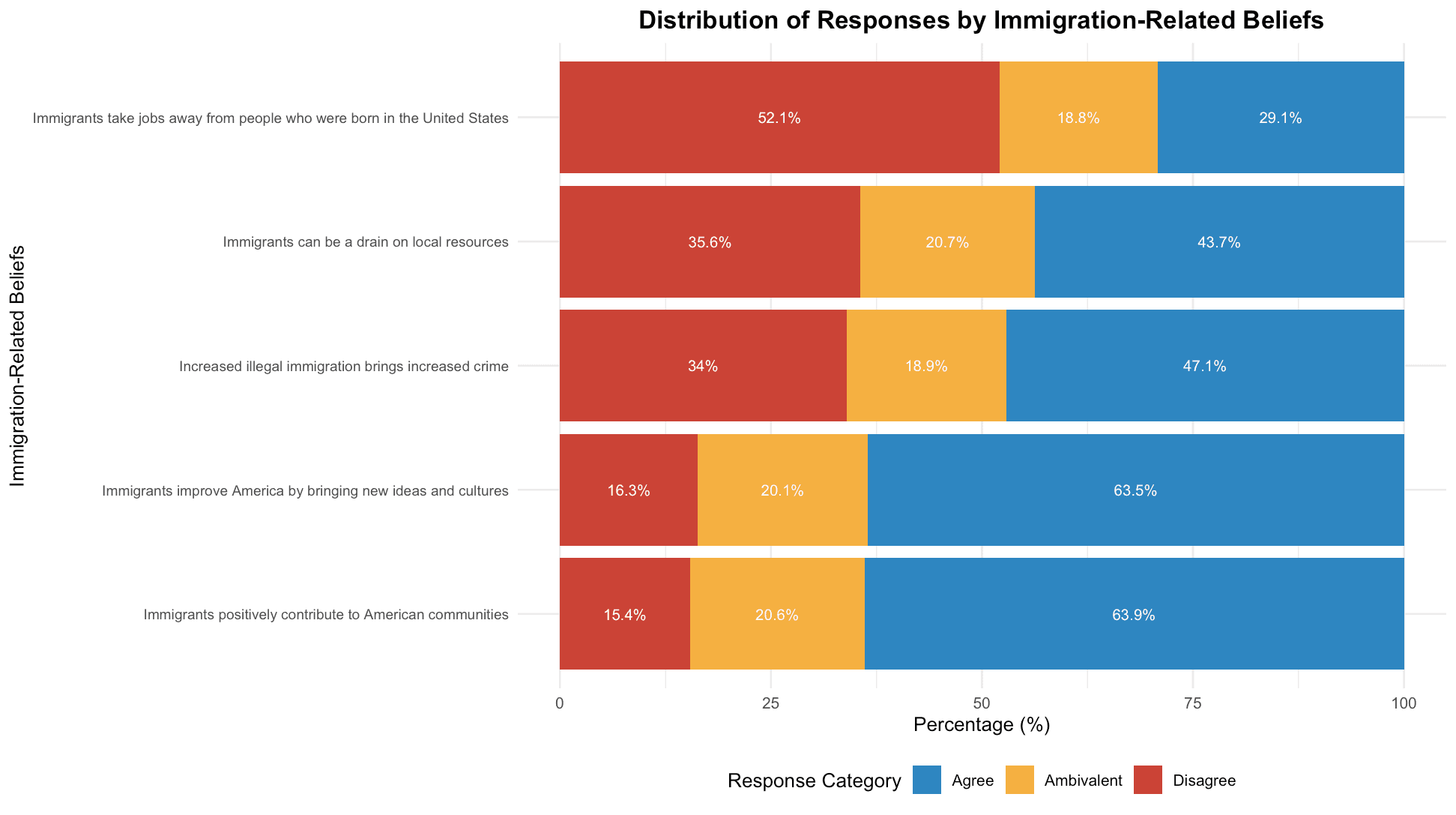
Figure 6. Distribution of immigration beliefs and attitudes in our sample.
Conclusion
Our follow-up study reveals a dynamic picture of Latino voters’ attitudes about misinformation, immigration statements, and political claims associated with Kamala Harris and Donald Trump as we approach the 2024 election. The data points to several encouraging trends:
• General stability in the rates of belief in misinformation, with a decline in rates of belief in broader conspiratorial narratives about elites, which were surprisingly high back in March/April.
• Slightly increased trust overall in democratic institutions and election stakeholders, particularly election administrators and secretaries of state.
• An uneven responsiveness to political claims, with both pro-Democratic and pro-Republican claims resonating with Latino voters at different levels based on their support for either candidate. Consult Equis Research for a much deeper dive into Latino issue preferences and voting behaviors.
The growing trust in electoral institutions and the lack of notable increases in misinformation beliefs provide a source of optimism as the election nears. This trend shows Latinos remain skeptical of lies online, and that ongoing efforts to counter online harms may be taking hold. Journalists, civil society stakeholders, and others must keep pushing for a stronger and healthier Internet for democracy.
However, our findings also highlight ongoing challenges. The persistent concerns about unauthorized immigration, despite overall positive attitudes towards immigrants, underscore the complexity of this issue for many Latino voters. Political campaigns and civic organizations will need to approach immigration messaging thoughtfully, addressing potential concerns while reinforcing the positive contributions of immigrants. For more research on immigration messaging, check out the work of Equis Research and America’s Voice.
METHODOLOGY
This poll was administered online with an entirely Latino sample from September 6 to September 30, 2024. 90% of respondents chose to complete the survey in English, and 10% in Spanish.
The survey had coverage of all 50 states (plus DC), with the states with the largest Latino populations (Texas, California, Florida, and New York) accounting for 59% of the sample.
Latino Democrats comprised 47% of the sample, Independents made up 24%, and Latino Republicans accounted for 29%, with the remaining respondents answering ‘unsure’.
To address sample imbalances, all analyses and descriptive statistics are weighted to population targets using vendor-provided survey weights.
As part of the survey, we tested familiarity and belief in 7 broad misinformation narratives (conspiracies or hyper-partisan frames), and 15 specific false claims (left-wing, right-wing, non-partisan, and placebo claims).
